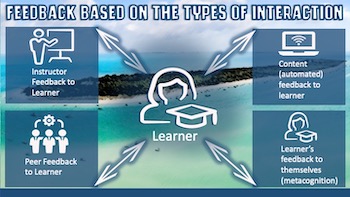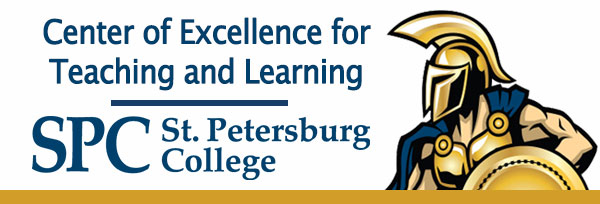Summer Institute Day 3 Session 2: Feedback
“Feedback is the formal and explicit comments that someone, usually a teacher, provides to students about their academic work.” David Nicol (2021)
The Feedback session for Summer Institute 2022, focused on the ways students receive feedback, and how to utilize tools and techniques to help foster effective and meaningful feedback for students.
In a typical classroom setting, students receive feedback in four main ways: instructor feedback to learner, content feedback (automated) to learner, peer feedback to learner, and learner feedback to themselves (metacognition).

Meaningful feedback:
- is timely, regular, and ongoing.
- provides specific guidance on how to improve.
- focuses on process, not results.
- emphasizes the task, not the learner’s ability.
During the session, opportunities were provided for faculty to share their tips and tricks on feedback. Much of what was discussed and shared can be found on this Google document: Feedback Strategies Sharing Document. Some of the notable comments include:
- Acknowledge the students’ perspective and thoughts. Lead with positivity.
- Use screencapture comparing their work to an example.
- Send weekly email feedback on course progress.
- Send congratulatory emails for good grades on assignments.
- Make phone calls/video calls to students who are struggling.
- Use gradebook item statistics to find groups of students to contact. Build a variety of positive feedback messages that can be reused from week to week for each course.
- Have a discussion where students can make comments on other students’ work.
- Have students peer review one another’s papers/projects using track changes in word and using a checklist. Then the student must address the reviewer’s comments by either making changes or justifying why they think they should not make the change.
- When doing team projects, provide opportunities for students to provide constructive feedback to their colleagues.
- Provide students with a reflection activity on what they would have done differently, and what they learned from the activity.
- Have students do weekly self reflections/assessments.
View the recording of the Feedback presentation.
For more assistance, contact the IDEAS team: IDEAS@spcollege.edu
Resources
- David Nicol (2021) The power of internal feedback: exploiting natural comparison processes, Assessment & Evaluation in Higher Education, 46:5, 756-778, DOI: 10.1080/02602938.2020.1823314: https://www.tandfonline.com/doi/pdf/10.1080/02602938.2020.1823314?needAccess=true
- Davis, B. G. (2009). Tools for teaching (2nd ed.). Jossey-Bass. (ACUE)
- Effective Feedback for Deeper Learning: https://www.activelylearn.com/post/effective-feedback-for-deeper-learning
- Michael Henderson, Michael Phillips, Tracii Ryan, David Boud, Phillip Dawson, Elizabeth Molloy & Paige Mahoney (2019) Conditions that enable effective feedback, Higher Education Research & Development, 38:7, 1401-1416, DOI: 10.1080/07294360.2019.1657807: https://www.tandfonline.com/doi/epub/10.1080/07294360.2019.1657807?needAccess=true
- Quality Matters Standards, Higher Education Rubric, Sixth Edition: https://www.qualitymatters.org/sites/default/files/PDFs/StandardsfromtheQMHigherEducationRubric.pdf
- Sutton, R., Hornsey, M.J., & Douglas, K.M. (Eds., 2011), Feedback: The communication of praise, criticism, and advice. Peter Lang Publishing: New York: https://www.visiblelearning.com/sites/default/files/Feedback%20article.pdf
- Walvoord, B. E., & Anderson, V. J. (2010). Effective grading: A tool for learning and assessment in college (2nd ed.). San Francisco, CA: Jossey-Bass. (ACUE)
Tools
Tutorials
- Creating Groups with Discussions and Dropboxes
- Intelligent Agent: Sending an Email based on a Low Quiz Score
- Tutorial for Students: Reviewing a Quiz
Other




